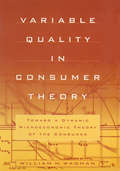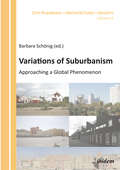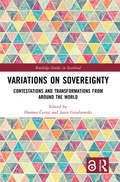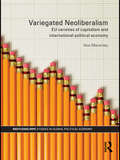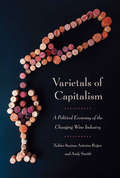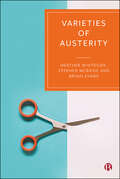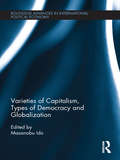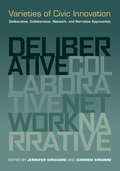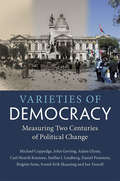- Table View
- List View
The Vantage Point: Perspectives of the Presidency, 1963-1969
by Lyndon B. JohnsonThe book focuses on a wide variety of accomplishments and events, both domestic and foreign, which shaped the Presidency of Lyndon Johnson. In addition to the war in Vietnam, Johnson tells of the War on Poverty here in the United States.
Vargas Llosa and Latin American Politics
by Juan E. De Castro Nicholas BirnsMario Vargas Llosa is a heterogeneous writer whose positions have often not been consistent from novel to novel, between his fictional and nonfictional work, between his literary and political commentary, and as his political commentary has proceeded over the decades. This analysis of his work reveals his insights into socio-political matters.
Variable Quality in Consumer Theory: Towards a Dynamic Microeconomic Theory of the Consumer
by W.M. WadmanExamines consumer decision-making on products and services of variable quality at the level of retail markets. Addresses for the first time consumer-producer interaction at the level of the individual consumer; issues of quality, consumption experience, and willingness-to-pay, as exhibited by individual consumers; and how these issues affect the decision-making process.
Varianzen der Transformation: Gesellschaftliche und industriepolitische Rahmenbedingungen für einen sozial-ökologischen Umbau (Studien der Bonner Akademie für Forschung und Lehre praktischer Politik)
by Wolfgang Schroeder Florian RanftDieser Sammelband gibt Denkanstöße für Antworten auf die Frage, welche Akteurskonstellationen im politischen System für die Transformation benötigt werden und wie die sozial-ökologische Wende in zentralen industriellen Sektoren gelingen kann. Wie können auf Grundlage der sich abzeichnenden Verteilungskonflikte des ökologischen Umbaus konkrete transformative Maßnahmen mit Blick auf ihre sozialen Implikationen umgesetzt werden? Hierzu erarbeitet der Band eine theoretische Grundlage für die Gelingensbedingungen zur Umsetzung der Transformation. Darauf aufbauend werden die territorialen Ebenen des Wandels in Ostdeutschland und im Ruhrgebiet und Konfliktlinien zwischen Stadt und Land beleuchtet, sowie das Potential regionaler Innovationsnetzwerke besprochen.
Variations in Economic Analysis
by Harriet L. Parmet J. Richard Aronson Robert ThorntonFor over fifty years, Eli Schwartz has inspired generations of economists through his prolific publications and dedicated in teaching. In 2008, the Martindale Center for the Study of Private Enterprise at Lehigh University invited prominent academics and practitioners--including Nobel Prize recipients, Robert Solow and Harry Markowitz, and former Chairman of the Economic Advisers to Ronald Reagan, Murray Weidenbaum--to contribute pieces that reflect their own approaches to issues that Schwartz has explored over the long span of his career. The twelve original essays cover a range of topics, including tax reform, corporate finance, fiscal policy, banking, economic growth, and globalization, representing a variety of methodologies, including economic theory, econometrics, and case analysis. The collection emphasizes the underlying connections among seemingly disparate facets of economic activity, and underscores the tremendous influence of Schwartz on economic analysis, policy, and leadership today.
Variations of Suburbanism: Approaching a Global Phenomenon (City Planning - Architecture - Society #5)
by Barbara SchöningConsidered to be sub-ordinated and sub-prime to the city, sub-urban areas receive little attention by researchers and designers. However, it's the rapidly growing areas outside the central cities that pose the biggest questions of the urban millennium: How can the scattered patchwork of urban areas and social spaces linked by networks of highways and public transportation function as a sustainable and livable urban environment? Answering this question requires understanding suburban spaces as heterogeneous urban areas with distinct local characteristics, qualities, and problems. Following this path, Variations of Suburbanism explores formation, characteristics, and trends of suburban areas all over the world. It provides insights on common features and differences of suburban governance, design, and infrastructure and discusses strategies to understand and design suburban areas in an increasingly sub-urbanizing world.
Variations of the Welfare State
by Franz-Xaver KaufmannIn the burgeoning literature on welfare regimes and typologies, this comparative study offers a stimulating new perspective. Kaufmann, the doyen of the sociology of social policy in Germany, emphasizes norms, culture and history, in contrast to political economy approaches. Comparing Britain, Sweden, France and Germany, Kaufmann highlights the "idiosyncrasy" of each welfare state: countries are compared with regard to their state traditions and the relationship between state and civil society; their national "social questions"; their economic systems, including the unions and labour law; social security and redistribution; and their personal social services and education. The socio-cultural approach enables Kaufmann to show that not all modern states are welfare states. Some are just "capitalism" (the USA), others are "socialism" (the former Soviet Union). In this light, the (essentially North-West European) welfare state is portrayed as a third way between capitalism and socialism.
Variations on Sovereignty: Contestations and Transformations from around the World (Routledge Studies in Statehood)
by Hannes Černy Janis GrzybowskiThis edited book explores diverse contestations and transformations of sovereignty around the world. Sovereignty plays a central role in modern political thought and practice, but it also remains fundamentally contested. Depending on the context and perspective, it seems either omnipresent or elusive, liberating or oppressive, fading or resilient. Indeed, if in recent decades sovereignty has been expected to wane, today it is back on the agenda; not as the solid bedrock of modern – international – politics, which it never was, but as variations on a concept and institution that are ever contested and, as a result, constantly transforming. Bringing together perspectives from various disciplines, including International Relations (IR), political theory, geography, law, and anthropology, this volume: • goes beyond debates over the resilience or decline of sovereignty to instead emphasize how precisely the inherent ambiguities, tensions, and contestations in scholarship and practice spark sovereignty’s manifold transformations; • offers three theoretical chapters that examine the illusions, contradictions, transformation, and lasting appeal of sovereignty and the nation-state; • explores sovereignty from various disciplinary perspectives in 11 empirical chapters that highlight its role in different contexts around the world, from the European Union (EU) to the South China Sea, to Western Sahara and Palestine; • problematizes the interplay between theory and practice of statehood and sovereignty, as in the perception of Northern Cyprus as a ‘fake state’, scholars’ promotion of Kurdish ‘statehood’ in Iraq, and studies affirming the ‘Islamic State’. This book will be of much interest to students of statehood, sovereignty, conflict studies and International Relations.
Variegated Neoliberalism: EU varieties of capitalism and International Political Economy (RIPE Series in Global Political Economy)
by Huw MacartneyWe know from the cost of the 2007-09 crisis that transnational finance does not operate in a realm removed from our everyday lives. Variegated Neoliberalism explains why its inequalities persist and how they undermine more social-minded policies towards finance in the EU. The book suggests that large financial groups capitalize on broader changes in capitalism and emerging assumptions about what benefits society at large. Those pushing these political-economic projects present policy change to cope with financial globalization as a new common sense. Macartney's argument then contests these assumptions through an analysis of the spatial relations of transnational actors, and the political claims made within finance and research communities. Rather than relying on umbrella concepts like 'transnational capitalist class', Variegated Neoliberalism emphasises the national-domestic foundations for transnationalization and what we commonly understand as neoliberalism. The book provides comparative analyses of global and European banking communities, and economic research centres, in the UK, France, and Germany. It explains the constellations underpinning the current neoliberal order in global finance, and the realms of possibility for challenges to it.
Varietals of Capitalism: A Political Economy of the Changing Wine Industry
by Xabier Itcaina Antoine Roger Andy SmithVarietals of Capitalism shows that politics is an omnipresent part of the economics of wine and of economic activity in general. Based on a four-year research project encompassing fieldwork in France, Spain, Italy, and Romania, Xabier Itçaina, Antoine Roger, and Andy Smith examine the causes and effects of a radical reform adopted at the EU level in 2008. Regulatory change politically transformed the rationale of EU support to the wine industry, from shaping the supply side to encouraging producers to adapt to the demands of a supposedly "new consumer." To explain the adoption and impact of the reform, the authors develop an analytical framework to capture the actors—their perceptions, preferences, and interdependencies—within an industry crisscrossed by institutions located at the global, European, national, and local scales. This framework combines concepts and lessons from historical institutionalism and regulationist economics, Bourdieu's field theory, and the sociology of public policymaking. The authors reject accounts that attribute policy change simply to material determinants and “the invisible hand of the market.” They emphasize the crucial importance of institutions within sectors of the economy, and propose ways to bolster constructivist approaches to political economy by linking industrial change to scientific and bureaucratic balances of power. This book’s novel focus on different levels of institutional impact should prove influential in the study of the politics of industry, and more broadly within the comparative analysis of capitalism.
Varieties of Anti-Fascism
by Nigel Copsey Andrzej OlechnowiczThis volume examines the varieties of anti-fascism in inter-war Britain. Ordinarily anti-fascism is defined in terms of anti-fascist activism. By extending the scope of the concept, this book breaks new ground. Chapters examine political parties, the state, the media, women, the churches, and intellectuals.
Varieties of Austerity
by Heather Whiteside Stephen McBrideAusterity is not always one-size-fits-all; it can be a flexible, class-based strategy taking several forms depending on the political-economic forces and institutional characteristics present. This important book identifies continuity and variety in crisis-driven austerity restructuring across Canada, Denmark, Ireland and Spain. In their analysis, the authors focus on several components of austerity, including fiscal and monetary policy, budget narratives, public sector reform, labor market flexibilization, and resistance. In so doing, they uncover how austerity can be categorized into different dynamic types, and expose the economic, social, and political implications of the varieties of austerity.
Varieties of Capitalism: The Institutional Foundations of Comparative Advantage
by Peter A. Hall David SoskiceWhat are the most important differences among national economies? Is globalization forcing nations to converge on an Anglo-American model? What explains national differences in social and economic policy? This pathbreaking work outlines a new approach to these questions. It highlights the role of business in national economies and shows that there is more than one path to economic success. The book sets a new intellectual agenda for everyone interested in relations between politics, economics, and business.
Varieties of Capitalism and Business History: The Dutch Case (Routledge International Studies in Business History)
by Keetie E. SluytermanThe financial crisis of 2008 brought new urgency to the question how best to organise national economies. This volume gives a business history perspective on the Varieties of Capitalism debate and considers the respective merits of the liberal and coordinated market economies. It looks at individual firms and business people as well as institutions and takes a long-term perspective by covering the whole 20th century. The authors examine both continuity and change with a particular focus on the Netherlands, a nation with an open economy, situated between two countries that oppose each other in the way they organize their economies: Germany and Great Britain. The Netherlands also provides an important case study with Dutch business maintaining strong links to the United States, widely considered to be the ‘typical’ liberal market economy. Contributors address the main topics of the capitalism debate, including labour relations, corporate governance, the firm and its leaders, coordination between firms, innovation, multinationals as agents of change, and economic performance. They show that the Netherlands moved from a mostly liberal market economy before 1914 towards a coordinated market economy from the 1930s onwards, and – up to a certain extent – back again to a more liberal market economy. Under both varieties of capitalism the country experienced economic growth and stagnation, but a more equal division of wealth occurred in the coordinated market economy only. Wars and international economic crises offered moments for revaluation and changes of tack. This book raises questions for every country around the globe: How is change being brought about? Can one see different results from a liberal or a more coordinated market economy? And most critically: which system is more effective in bringing prosperity and enabling enough people to share in the wealth?
Varieties of Capitalism in Asia: Beyond the Developmental State (Critical Studies of the Asia-Pacific)
by Jitendra Uttam David HundtThis book devises an innovative new way of explaining how socioeconomic orders shape capitalism in Asia. Hundt and Uttam go beyond both the ‘varieties of capitalism’ approach, which is mainly used to analyse Western capitalism, and the 'developmental state' thesis, which is the primary framework for analysing capitalism in Asia, and propose a new and innovative approach to the emergence of capitalist systems. Rather than focusing solely or predominantly on the state, they argue, it is necessary to bring society back in to an analysis of capitalism. The authors apply this approach to case studies from across the region: Japan; South Korea and Taiwan; Hong Kong and Singapore; Malaysia and Thailand; and India and China. This volume will appeal to historians, political scientists and economists, as well as policymakers, who are interested in the transformation of the Asian region since World War II.
Varieties of Capitalism, Types of Democracy and Globalization (Routledge Advances in International Political Economy)
by Masanobu IdoThis book combines two strands of international political economy; examining how capitalism and democracy shape and are shaped by each other. Although until now considered separately, this path-breaking book proposes an innovative view of a political-economic system that inextricably links the model of capitalism to the type of democracy, where continuation is mutually reinforced. Advanced countries have achieved post-war affluence by adopting one of two contrasting models of capitalism; liberal market economies or coordinated market economies, and two opposing types of democracies: consensus or majoritarian democracies. Expert contributors in the field consider the question of whether and how globalization is transforming the post-war political–economic systems of advanced countries such as Britain, France, Germany, Italy and Japan, as well as the question of how it is shaping democracy and capitalism combinations in former socialist countries in Eastern Europe and the new "capitalist" China. The book examines various topics, including party system change, a political dilemma of the established party, and corporate governance reforms, to posit an original an innovative theory of international political economy. Variety of Capitalism, Types of Democracy and Globalization will be of interest to students and scholars of comparative politics, political economy and globalization.
Varieties of Civic Innovation: Deliberative, Collaborative, Network, and Narrative Approaches
by Jennifer Girouard Carmen SirianniIn this collection of original essays, empirical analysts and theorists across disciplines turn a critical eye to a variety of recent institutional forms and styles of innovation. They examine lived reality and theoretical underpinning, promise and accomplishment, but also the pitfalls and capacity-building challenges that face virtually all attempts to bring citizen voice, knowledge, and skill to the center of public problem solving. Their analyses are both hopeful and hard-headed and are guided by commitments to help understand appropriate fit and realistic sustainability. Cases include face-to-face deliberation, online networking and citizen journalism, policy forums, and community and stakeholder planning sessions across local, state and federal contexts. Policy issues run a broad gamut from community and regional economic development and environmental sustainability to minority rights and gay marriage.
Varieties of Civic Innovation: Deliberative, Collaborative, Network, and Narrative Approaches
by Jennifer Girouard and Carmen SirianniIn this collection of original essays, empirical analysts and theorists across disciplines turn a critical eye to a variety of recent institutional forms and styles of innovation. They examine lived reality and theoretical underpinning, promise and accomplishment, but also the pitfalls and capacity-building challenges that face virtually all attempts to bring citizen voice, knowledge, and skill to the center of public problem solving. Their analyses are both hopeful and hard-headed and are guided by commitments to help understand appropriate fit and realistic sustainability. Cases include face-to-face deliberation, online networking and citizen journalism, policy forums, and community and stakeholder planning sessions across local, state and federal contexts. Policy issues run a broad gamut from community and regional economic development and environmental sustainability to minority rights and gay marriage.
Varieties Of Conservatism In America
by Peter BerkowitzThis book examines the questions that divide conservatives today and reveals the variety of answers put forward by classical conservatives, libertarians, and neoconservatives. The contributors--drawn from varied professional backgrounds--each bring a distinctive voice to bear, reinforcing the book's basic notion that conservatism in America represents a family of opinions and ideas rather than a rigid doctrine or set creed.
Varieties of Conservatism in America
by Peter BerkowitzThis book examines the questions that divide conservatives today and reveals the variety of answers put forward by classical conservatives, libertarians, and neoconservatives. The contributors—drawn from varied professional backgrounds—each bring a distinctive voice to bear, reinforcing the book's basic notion that conservatism in America represents a family of opinions and ideas rather than a rigid doctrine or set creed.
Varieties of Democracy: Measuring Two Centuries of Political Change
by Michael Coppedge John Gerring Adam Glynn Carl Henrik Knutsen Staffan I. Lindberg Daniel Pemstein Brigitte Seim Svend-Erik Skaaning Jan TeorellVarieties of Democracy is the essential user's guide to The Varieties of Democracy project (V-Dem), one of the most ambitious data collection efforts in comparative politics. This global research collaboration sparked a dramatic change in how we study the nature, causes, and consequences of democracy. This book is ambitious in scope: more than a reference guide, it raises standards for causal inferences in democratization research and introduces new, measurable, concepts of democracy and many political institutions. Varieties of Democracy enables anyone interested in democracy - teachers, students, journalists, activists, researchers and others - to analyze V-Dem data in new and exciting ways. This book creates opportunities for V-Dem data to be used in education, research, news analysis, advocacy, policy work, and elsewhere. V-Dem is rapidly becoming the preferred source for democracy data.
Varieties of European Economic Law and Regulation
by Kai Purnhagen Peter RottThis is the first book to comprehensively analyze the work of Hans Micklitz, one of the leading scholars in the field of EU economic law. It brings together analysts, academic friends and critics of Hans Micklitz and results in a unique collection of essays that evaluate his work on European Economic Law and Regulation. The contributions discuss a wide range of Micklitz' work: from his theoretical work on private law beyond party autonomy, with a special focus on its regulatory function, to the illustration of how his work has built the basis for current solutions such as used in solving the financial crisis. The book is divided into sections covering foundations of private law, regulatory law, competition and intellectual property law, product safety law, consumer contract law and the enforcement of law. This book clearly shows the enormous impact of Hans Micklitz' work on the EU legal system in both scholarship and practice.
Varieties of Feminism: German Gender Politics in Global Perspective
by Myra Marx FerreeVarieties of Feminism investigates the development of German feminism by contrasting it with women's movements that arise in countries, like the United States, committed to liberalism. With both conservative Christian and social democratic principles framing the feminist discourses and movement goals, which in turn shape public policy gains, Germany provides a tantalizing case study of gender politics done differently. The German feminist trajectory reflects new political opportunities created first by national reunification and later, by European Union integration, as well as by historically established assumptions about social justice, family values, and state responsibility for the common good. Tracing the opportunities, constraints, and conflicts generated by using class struggle as the framework for gender mobilization-juxtaposing this with the liberal tradition where gender and race are more typically framed as similar--Ferree reveals how German feminists developed strategies and movement priorities quite different from those in the United States.
Varieties of Governance
by Giliberto Capano Michael Howlett M. RameshThe study of governance may be currently in fashion, but it is also a firmly-established lens through which the complexities of contemporary policy making can be analysed while examining the ways in which a society and its political processes are organized and steered. Governance thus needs to be seen as a general concept within political analysis which offers a necessary heuristic tool for understanding the complexities of political processes, the policies these produce and the outcomes they generate. However, despite a great deal having been written on the subject in recent years, questions remain about many fundamental aspects of governance. This is especially the case when trying to define the modes of governance and their dynamics. Many varieties of governance exist, both cross-nationally and cross-sectorally: Understanding why and how it is important for the future of governance studies is the subject of the cross-national and theoretically-informed case studies presented inthis volume.
Varieties of Legal Order: The Politics of Adversarial and Bureaucratic Legalism (Law, Courts and Politics)
by Thomas F. Burke Jeb BarnesAcross the globe, law in all its variety is becoming more central to politics, public policy, and everyday life. For over four decades, Robert A. Kagan has been a leading scholar of the causes and consequences of the march of law that is characteristic of late 20th and early 21st century governance. In this volume, top sociolegal scholars use Kagan’s concepts and methods to examine the politics of litigation and regulation, both in the United States and around the world. Through studies of civil rights law, tobacco politics, “Eurolegalism,” Russian auto accidents, Australian coal mines, and California prisons, these scholars probe the politics of different forms of law, and the complex path by which “law on the books” shapes social life. Like Kagan’s scholarship, Varieties of Legal Order moves beyond stale debates about litigiousness and overregulation, and invites us to think more imaginatively about how the rise of law and legalism will shape politics and social life in the 21st century.


